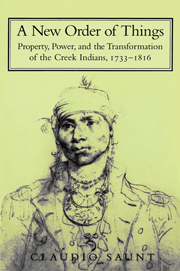Book contents
- Frontmatter
- Contents
- Illustrations and maps
- Abbreviations
- Acknowledgments
- Introduction
- PART I POWER AND PROPERTY BEFORE THE NEW ORDER, 1733–1783
- 1 Fair persuasions: Power among the Creeks
- 2 “Martial virtue, and not riches”: The Creek relationship to property
- PART II THE NEW ORDER EMERGES, 1784–1796
- PART III THE “PLAN OF CIVILIZATION,” 1797–1811
- PART IV THE NEW ORDER CHALLENGED, 1812–1816
- Index
1 - Fair persuasions: Power among the Creeks
Published online by Cambridge University Press: 25 July 2009
- Frontmatter
- Contents
- Illustrations and maps
- Abbreviations
- Acknowledgments
- Introduction
- PART I POWER AND PROPERTY BEFORE THE NEW ORDER, 1733–1783
- 1 Fair persuasions: Power among the Creeks
- 2 “Martial virtue, and not riches”: The Creek relationship to property
- PART II THE NEW ORDER EMERGES, 1784–1796
- PART III THE “PLAN OF CIVILIZATION,” 1797–1811
- PART IV THE NEW ORDER CHALLENGED, 1812–1816
- Index
Summary
In early summer 1735, nearly fifty Native Americans from the Chattahoochee River, which now separates the states of Georgia and Alabama, set out for a bluff near the mouth of the Savannah River where newcomers had established an outpost two years earlier. Already familiar with the Georgia colonists, they undertook the 300-mile trip only after a specific request from these new British neighbors. The colonists obligingly gave them “presents” on their arrival, but not before performing a military parade to reassure themselves and convince the Indians that the blankets and shirts were gifts rather than tribute. With ensigns flying and drums marking time, grenadiers and “gentlemen” volunteers marched into the central square of Savannah and fired forty-seven cannons. The guests then responded with their own story about power and authority. Before an audience of “Sundry Gentlemen and Freeholders,” Chigellie and Antioche, who both lived in Coweta town, where Columbus, Georgia, now sits, held forth with a story that lasted for two days.
The meaning of the story was lost on the audience, even though Chigellie and Antioche sent an English translation, carefully written in red and black ink on a buffalo skin, to the Georgia trustees in London. One listener described the content of the narrative as the “Rise and some Particular adventures of the Cussitaws,” but the story actually told about the present politics of the inhabitants of the Deep South (including the Cussitaws or Kasihtas).
- Type
- Chapter
- Information
- A New Order of ThingsProperty, Power, and the Transformation of the Creek Indians, 1733–1816, pp. 11 - 37Publisher: Cambridge University PressPrint publication year: 1999



